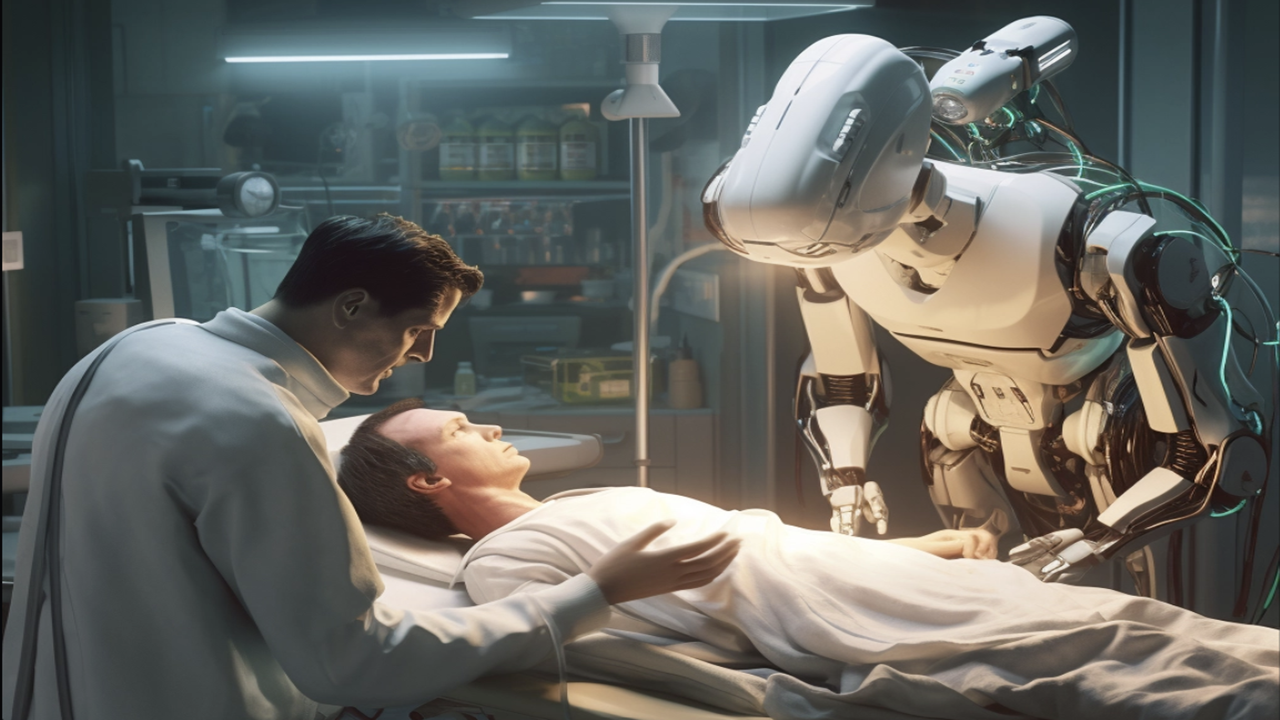Your Next Surgeon Might Be a Machine: How AI is Transforming Healthcare
Robots in surgery? AI predicting diseases? It's not sci-fi anymore! This blog dives into the fascinating world of Artificial Intelligence in medicine, exploring how it's changing diagnosis, treatment, and even surgery. Get ready for a glimpse into the future of healthcare, where machines and doctors team up to keep you healthy.

Remember those clunky metal giants from old sci-fi movies? Well, the robots invading medicine today are a far cry from their clunky cousins. They're nimble, precise, and even compassionate (at least that's what they tell us!). Buckle up because we're taking a whirlwind tour of AI in medicine, from robots assisting in surgery to algorithms predicting your next illness. We'll peek at Da Vinci's futuristic sketches, marvel at AI's virtual brainpower, and maybe even meet a robot nanny for Grandma. So, ditch your fears of robot uprisings and get ready for a glimpse into the future of healthcare, where humans and machines team up to keep you healthy. Are you ready? Let's go!
The Rise of the Machines: How AI is Changing Medicine
Robots! The word conjures images of hulking metallic beasts from sci-fi movies, but in reality, they're already assisting with delicate surgery and caring for the elderly. This is just one glimpse into the fascinating world of Artificial Intelligence (AI) in medicine.
From Da Vinci's Dreams to Robotic Reality
The story of AI in medicine starts not with computers, but with Leonardo da Vinci. His intricate sketches of human-like robots inspired generations of engineers, even influencing the design of today's surgical robots like the "Da Vinci." Fast forward to the 20th century, and computers enter the scene, tackling complex math problems and eventually beating chess champions.
AI's Two Sides: Virtual Brains and Helpful Hands
In the world of medicine, AI operates in two primary realms: the virtual and the tangible. The virtual side uses clever algorithms (think of them as brain-like programs) to analyze massive amounts of data. This helps doctors diagnose diseases faster, predict risks, and even personalize treatments. On the physical side, robots are stepping in as surgeon's assistants, companions for the elderly, and even tiny nanorobots delivering drugs directly to diseased cells.
Challenges and Future Visions
Of course, with great power comes great responsibility. Ethical concerns and the need for careful testing are crucial as AI becomes more involved in healthcare. Yet, the potential is immense. Imagine AI personalizing your healthcare based on your unique genes, or robots seamlessly assisting in complex surgeries. It's a future where technology and medicine intertwine, promising a healthier tomorrow.
This is just a taste of the amazing things AI is doing in medicine. So, the next time you hear the word "robot," remember, that it's not just about science fiction anymore. It's about the future of healthcare, and it's happening right now.
- READ MORE ON:
- AI in medicine
- Surgical robots
- Da Vinci surgical system
- Virtual brain algorithms
- Nanorobots in healthcare
- Future of healthcare technology
- Robotics in surgery
- Ethical concerns in AI healthcare
- Personalized healthcare with AI
- Medical advancements with artificial intelligence
- Human-robot collaboration in medicine
- Predictive algorithms in disease diagnosis
- AI companions for the elderly
- Technology and medicine integration
- Healthcare of the future
- AI-assisted surgery
- Robots in healthcare
- Challenges of AI in medicine
- Nanotechnology in medical treatment
- Impact of AI on disease prevention.










